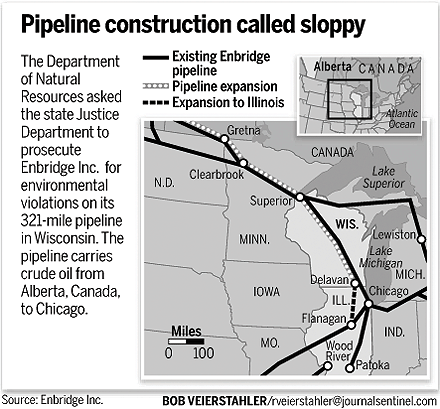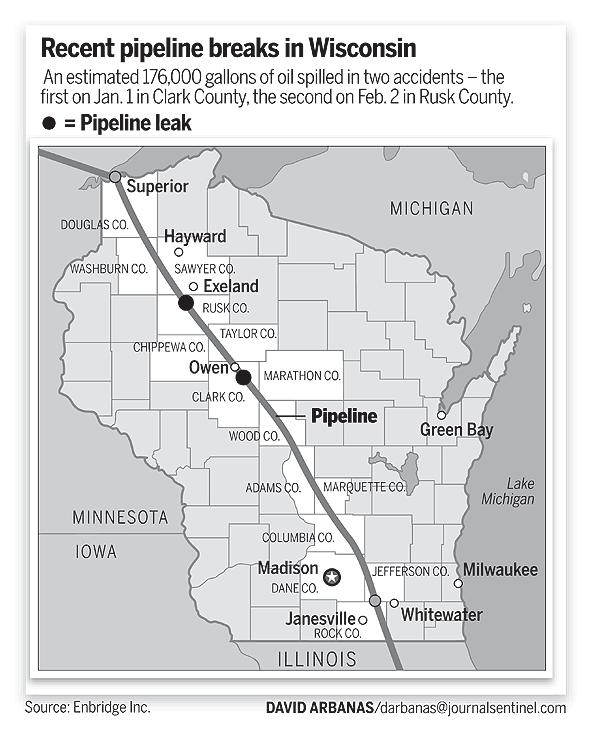

Enbridge spills oil in Wisconsin
COMMENT: Enbridge has apparently resucitated its Gateway Pipeline proposal (big oil pipe from Edmonton to Kitimat, not quite so big condensate pipe from Kitimat to Edmonton). The company promises promises, but First Nations aren't buying, and critics and supporters alike recognize how challenging the terrain is, that the pipeline will have to cross salmon rivers, etc.
So, to demonstrate what an exemplary job it can do, Enbridge oils up the countryside with another pipeline, in Wisconsin...
State says pipeline builder damaged streams, wetlands
Lee Bergquist, Milwaukee Journal Sentinel, 24-May-2008
Oil spill tainted water table
Lee Bergquist, Milwaukee Journal Sentinel, 15-Feb-2008
Oil group cleans spill in Clark County
Thomas Content, Milwaukee Journal Sentinel, 03-Jan-2008
State says pipeline builder damaged streams, wetlands
DNR seeks penalties for Enbridge's recent project
By LEE BERGQUIST
lbergquist@journalsentinel.com
Milwaukee Journal Sentinel
Posted: May 24, 2008
The state Department of Natural Resources is alleging that a Canadian company is responsible for more than 100 environmental violations related to the construction of a 321-mile pipeline spanning much of Wisconsin.

The DNR has asked the state Justice Department to prosecute Enbridge Inc. of Calgary, Alberta, for damaging waterways and wetlands while building the pipeline.
The pipeline is part of a $2.1 billion project to transport crude oil from the oil sands region of Alberta to Chicago and was touted by supporters as a new way of moving 400,000 barrels of raw petroleum into the Midwest a day.
In Wisconsin, the 42-inch and 20-inch pipeline runs along an existing pipeline route from Superior to Delavan, where it connects with another pipeline.
The DNR said that Enbridge workers illegally cleared and disrupted wooded wetlands, and were responsible for other lax practices that resulted in discharging sediment into waterways.
There were no oil spills, although the company was responsible for major spills on a companion pipeline in 2007.
The Wisconsin Wetlands Association has been monitoring the project by tracking public documents from DNR inspectors.
The group has pressed the DNR since last fall to refer Enbridge for prosecution.
"The project has been sloppy," said Erin O'Brien, the association's wetland policy and conservation specialist.
She said there has been a pattern of smaller violations that, when taken as a whole, are likely to cause long-term damage.
The DNR has spent considerable time on the case because of the size and complexity of the project, said Susan Crawford, administrator of the division of enforcement and science.
"We think a significant penalty is appropriate," Crawford said.
A phone call and e-mail to the spokesman at the Justice Department was not returned on Friday. An attorney at the agency working on the case declined to comment.
Documents show scores of incidents in which workers failed to protect wetlands and waterways, allowing mud and sediments to flow into water bodies.
"I am not minimizing there was some major erosion into streams," said Denise Hamsher, director of the federal and state regulatory affairs at Enbridge Energy Co. Inc., a unit of Enbridge.
But by the end of the year, "we will have very high restoration and very little evidence of a pipeline."
She said oil is beginning to fill into the pipeline, but it is not yet operational.
A second Enbridge project that will run 23 miles in Wisconsin from Delavan through Rock County into Illinois was approved recently by the DNR. Despite concerns over the 321-mile pipeline, and previous spills, there was no formal opposition to the smaller project.
But at the start of the larger project, in December 2006, environmental groups, including the wetlands association, filed suit against the DNR, contending that the agency erred by not requiring an environmental impact statement.
In February 2007, the existing pipeline, which runs parallel to the new project, released 176,000 gallons of Canadian crude in Rusk County, one of the largest spills in the state's history. There was a separate spill of 50,000 gallons in Clark County in January 2007.
The DNR said the cleanup at both sites was completed and Enbridge crews continued to monitor groundwater supplies near the spill.
Oil spill tainted water table
Recent pipeline leak seeped into deep hole in northern Wisconsin
By LEE BERGQUIST
lbergquist@journalsentinel.com
Milwaukee Journal Sentinel
Posted: Feb. 15, 2007
An oil pipeline spill on Feb. 2 in Rusk County - one of the largest such accidents of its kind in state history - has been found to have contaminated the local water table, officials confirmed Thursday.

The accident is one of two resulting in the release of at least 176,000 gallons of Canadian crude oil in northern Wisconsin since the beginning of the year.
Both are under investigation by the U.S. Office of Pipeline Safety and being reviewed by the state Department of Natural Resources.
The spills took place during construction of a 320-mile pipeline by Enbridge Inc. of Calgary, Canada, alongside its existing pipeline from Superior to near Whitewater.
The expansion has drawn criticism, and a lawsuit, from environmental groups including the Wisconsin Wetlands Association and the River Alliance of Wisconsin. The groups say the massive undertaking should have required a highly detailed environmental impact statement, instead of a less rigorous environmental assessment.
The DNR, which reviews such projects for effects on streams and wetlands, said the pipeline expansion did not rise to the level at which Enbridge needed to complete the more thorough analysis.
The operations in Wisconsin owned by Enbridge were formerly known as Lakehead Pipeline.
Enbridge is expected to seek permission shortly for construction of another pipeline - this time along private land where a pipeline doesn't currently exist.
The new pipeline would run through 23 miles of Rock County into Illinois, where the company also plans to add more capacity.
"Obviously, it does not make us feel very comfortable to trust Enbridge to do the right thing," said Lori Grant, policy program manager for the River Alliance.
"I think they are in a hurry to move forward with the project. It makes you wonder if these spills are a part of their M.O."
But Enbridge spokeswoman Denise Hamsher said, "We greatly regret what happened - and it's a spill we just won't accept."
She said the two spills are the first breaks in more than four years along the company's more than 8,000 miles of pipeline right of way in North America.
Enbridge says it operates the largest pipeline system in the world.
The company moves crude oil from northwest Canada to terminal locations, including Chicago, Detroit and Montreal.
Enbridge said the expansions are needed because of growing demand for Canadian crude - an alternative to Mideast oil.
Oil moved through Wisconsin is refined in Chicago.
The first of the two spills took place Jan. 1 in Clark County when 50,000 gallons of crude leaked onto farmland and into a drainage ditch.
Hamsher said the pipeline inexplicably cracked open and released crude until an operator could shut down the line from an operations center in Canada.
The oil was removed and returned to the pipeline, she said.
Crews will use equipment that runs the length of the pipeline to look for explanations for why the pipeline cracked, Hamsher said.
In the second accident, Feb. 2 near Exeland in Rusk County, crews mistakenly struck the existing pipeline while preparing to extend the new pipeline beneath a roadway.
Oil filled a large hole more than 20 feet deep before the flow was again shut down. But in this case, Enbridge and the DNR confirmed oil that was not removed seeped into the water table, a finding that could potentially affect local private water supplies.
But state officials and the company say the spill is in a remote locale where only one seasonal home lies within the immediate area.
Monitoring wells will be constructed around the accident site to determine the spread of the oil.
A spokesman for the Office of Pipeline Safety said it was premature to draw conclusions about the accidents.
DNR records show that the 1973 Lakehead Pipeline break in Jefferson County was the largest such break in Wisconsin.
The Feb. 2 spill appears to be the fourth biggest pipeline spill, according to DNR records, though officials at the agency said computerized records could be incomplete.
There have been other larger spills from bulk tanks, the DNR said.
In 2005, Enbridge reported 412,650 gallons of oil were spilled in its North American operations and largely contained within its operational facilities.
The two spills in Wisconsin this year would represent 43% of that figure.
State Oil Spills
The Two Spills
Jan. 1: Clark County. The pipeline cracked open and released crude oil until an operator could shut down the line from an operations center in Canada, an Enbridge spokeswoman said.
Feb. 2: Near Exeland in Rusk County. Crews mistakenly struck the existing pipeline while preparing to extend a new pipeline beneath a roadway. Oil filled a hole more than 20 feet deep before the flow was shut down, and some of it seeped into the water table.
Oil group cleans spill in Clark County
50,000 gallons from Enbridge cover field
By THOMAS CONTENT
tcontent@journalsentinel.com
Milwaukee Journal Sentinel
Posted: Jan. 3, 2007
The company planning to build a crude oil pipeline across Wisconsin is on the scene of an oil spill that sent more than 50,000 gallons of crude oil onto a farmer's field in Clark County.
Enbridge Inc. spokesman Larry Springer said as many as 40 workers were at the site Wednesday working to remove oil and tainted soil from the field in the Town of Curtiss, 43 miles west of Wausau.
The spill was detected Monday, when Enbridge noticed a drop in pressure along its pipeline, which carries crude oil from Canada through Minnesota and Wisconsin to Chicago and then Detroit. Crews said they detected a 4-foot long split on the seam of the pipe, which was put into service in 1998.
The cause of the split and spill remains under investigation, and Enbridge plans to conduct tests on the damaged piece of pipe. A new piece of pipe was installed Tuesday, and the pipe was preparing to resume carrying crude oil by Wednesday evening or today, Springer said.
The line, a 24-inch diameter pipe that is one of two run by Enbridge through Wisconsin, carries about 300,000 barrels of oil a day, he said. The state Department of Natural Resources is on site monitoring cleanup.
"There is oil penetrated about an inch into the ground," DNR spokesman Dave Weitz said. "They are moving quite rapidly to clean that surface up."
The spill covered about one-half acre of the field, and the environmental damage is marginal, he said.
Denise Hamsher, an Enbridge spokeswoman, said the last rupture of one of Enbridge's major pipelines occurred four years ago. The company transports 63 million gallons a day, she said.
Enbridge is preparing to start construction on a 321-mile pipeline that would cross Wisconsin, including on the same property where the spill occurred this week. That project received approval from the state Department of Natural Resources in November.
The spill comes less than two weeks after environmental groups sued to block construction of the pipeline, saying the DNR should have done a more exhaustive analysis and citing a track record of spills.
In Wisconsin, Enbridge has been responsible for seven spills since 1999, the DNR said. Six of the spills were at the company terminal in Superior and were largely contained, the agency said.
Springer said the company does not foresee the spill affecting the company's plans to build the new pipeline.
The Associated Press contributed to this report.
Posted by Arthur Caldicott on 26 May 2008